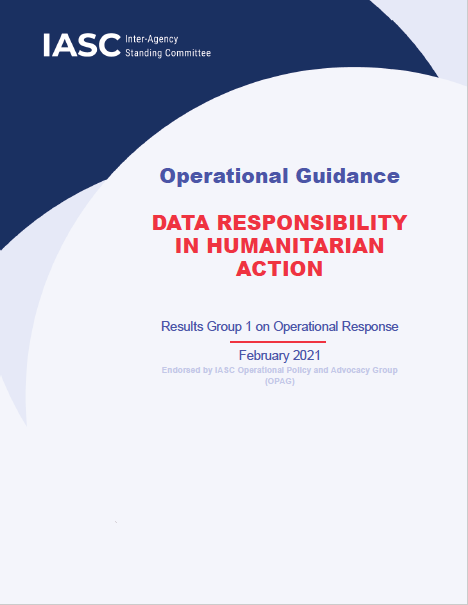Share
Data responsibility in humanitarian action is the safe, ethical and effective management of personal and non-personal data for operational response. The Centre worked with colleagues from IOM, UNHCR, and a range of other partners over the past year to develop a new Inter-Agency Standing Committee (IASC) Operational Guidance on Data Responsibility to support collective action in this area. Note: The Guidance has been updated as of 1 May, 2023. See an overview of the revision process and the latest version of the Guidance here.
This system-wide IASC Operational Guidance on Data Responsibility, which is a first, will support concrete steps for data responsibility in all phases of humanitarian action. It complements and is informed by existing guidance on data responsibility, both from development actors and within the broader humanitarian community. It is designed to leverage existing expertise on data responsibility, reinforce efforts and initiatives, and help mainstream best practice.
The Operational Guidance includes:
- an overview of data responsibility in humanitarian action;
- a set of principles for data responsibility in humanitarian action;
- key actions for data responsibility to be taken at different levels of humanitarian response, including specific roles and responsibilities for realizing these actions;
- and a set of Annexes that offer key definitions, examples of templates and tools for data responsibility, resources and references, and background information on the development of the Operational Guidance.
Given the dynamic and evolving nature of the challenges and opportunities for data responsibility in humanitarian action, the Operational Guidance will be reviewed and updated through a collaborative and consultative process every two years. Together with the Danish Refugee Council (DRC), IOM, and UNHCR, the Centre will co-chair the Data Responsibility Working Group (DRWG) to help monitor progress on the implementation of the IASC Operational Guidance and provide advice to our community.
We will also be updating the working draft OCHA Data Responsibility Guidelines to reflect this system-wide Operational Guidance and support OCHA offices in their work to advance the adoption of data responsibility in practice.
If you have questions or feedback on the Operational Guidance or would like to connect to discuss next steps for implementation, please contact centrehumdata@un.org.
